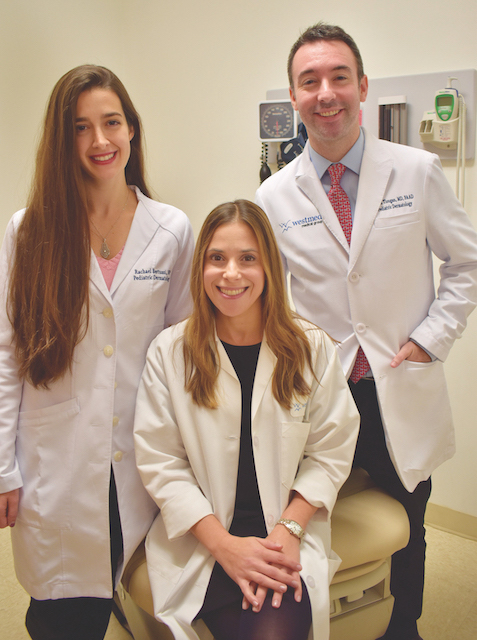The Westmed Pediatric Dermatology Department is deeply committed to offering state-of-the-art dermatologic care to pediatric and adolescent patients in a youth-friendly environment, designed to put young patients at ease. Their pediatric dermatologists have extensive experience and training in the treatment of skin conditions in children of all ages, from birth to adolescence.
What sets your practice apart?
Dr. Tlougan: At Westmed, we understand that caring for children requires a special kind of attention, and our team of experts collaborates with you and your child to develop individualized treatment plans to fit the needs of each patient. Both Dr. Lauren Geller and I have completed pediatric dermatology fellowships, and have obtained board certification in both general dermatology and pediatric dermatology. Rachael Bertuzzi, Westmed’s pediatric dermatology nurse practitioner, also has years of experience in treating children and youth with a variety of complex skin conditions.

What are the most common problems patients come to you with and how to you address them?
Dr. Geller: Using the latest medical research, our pediatric dermatologists evaluate and
manage numerous conditions of the skin, which can occur from infancy to childhood and
adolescence. We see a wide range of pediatric dermatology conditions, including acne, alopecia areata, atopic dermatitis (eczema), psoriasis, vitiligo and infections of the skin, including impetigo, warts and molluscum, as well as vascular birthmarks, including hemangiomas and port wine stains.
Dr. Tlougan: We recognize that many pediatric skin conditions can have a profound impact on a child’s self-esteem at any age of development, whether it is the disfiguring birthmark of a child or acne in an adolescent. We always take these factors into account when deciding on the best treatment plan for our patients and we work closely with our patients’ pediatricians, and other pediatric specialists, to ensure our integrated team is providing the most comprehensive care.
At what age should children start having skin checks?
Dr. Geller: Skin cancer in young children is rare, but it is never too early to start developing good sun protection habits. Children, like adults, should have periodic skin examinations by a dermatologist, especially if there is a family history of dysplastic (atypical) moles, melanoma, or other skin cancers such as squamous cell carcinoma or basal cell carcinoma. Parents should also periodically look at their child’s skin at home and call their dermatologist if they notice any changes. Issues such as skin cancer are often preventable and treatable with the proper sun protection and early detection.
Presented by Westmed Medical Group Pediatric Dermatology Department
BROOK TLOUGAN, MD
LAUREN GELLER, MD
RACHAEL BERTUZZI, FNP-BC
westmedgroup.com





